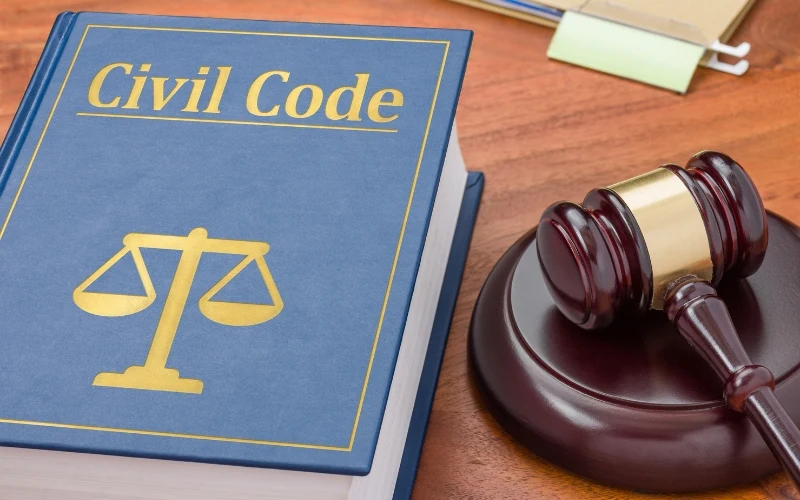
How to File a Civil Lawsuit – A Roadmap to Trial in North Carolina Civil Court
The complexity of civil litigation in North Carolina can be overwhelming. While your attorney will be well-versed in this area, it’s still important to understand the basic process in a civil litigation case and the steps to take, from filing the suit to meeting in court. In this article, we will take a closer look at the NC civil court process, explain how to file a civil lawsuit, and a explain typical civil lawsuit at the Superior Court level as an example.
Types of Civil Suits
Before we get into the process of how to file a civil suit in North Carolina, let’s take a look at what scenarios can be addressed by a civil lawsuit:
- Personal injury claims
- Contract disputes
- Property disputes
- Family law disputes
An experienced North Carolina civil suit attorney can take a look at your case and help you determine whether or not the civil court is the best place to handle your dispute. Before we outline how to file a civil lawsuit, let's first look at the different levels of civil court.
Levels of Civil Court
In North Carolina, there are three levels of trial court that handle civil litigation: Small Claims/Magistrate Court, District Court, and Superior Court. What warrants a case to be filed on the Superior Court level?
A key factor in determining which level of court to litigate a case depends on the dollar amount being disputed.
- Small Claims/Magistrate Court is the lowest level, handling disputes involving up to $10,000.
- District Court is the next level, which handles disputes up to $25,000.
- Superior Court is the upper-level trial court and handles disputes over $25,000.
While small claims court only handles civil cases, the other two exist for both civil and criminal cases, depending on the severity. Small claims court cases do not include a jury, instead, the case is heard and decided upon only by a judge.
District and superior courts, on the other hand, do allow an opportunity for a jury to hear a case.

Superior courts also handle appeals from lower courts. They hold court twice a year in each county. Now that we have looked at the levels of civil court, let's dive into what you came here for: how to file a civil lawsuit.
The Path to Superior Court: How to File a Civil Lawsuit
In the following paragraphs, we will explain how to file a civil lawsuit and break down the steps that typically occur in a trial. Civil litigation isn’t always black and white, but the general steps that occur along the path to a trial in Superior Court are:
1. Complaint: The Start of a Civil Lawsuit
To file a civil lawsuit, the Plaintiff (the party that initiates the lawsuit) will first have to file a complaint. To file a complaint, a document is prepared by a civil litigation attorney to spell out the facts and define the legal remedies being sought.
If the Plaintiff is seeking more than $25,000, the case will usually be filed directly in Superior Court. In North Carolina, the Clerk of Court charges a $200 fee for the complaint to be filed.
If the case involves a smaller sum of money, it will be filed in either small claims or district court. If you lose your claim in one of the lower courts, you may be able to later file an appeal with the superior court.
2. Service: Delivery of the Summons & Complaint to the Defendant
Next, the Plaintiff’s attorney has to obtain proper delivery of the summons and complaint to the Defendant (the party being sued). The summons is a document issued by the Clerk that accompanies the complaint, and puts the Defendant on official notice that a lawsuit has been filed against him.
Proper delivery of these documents to the Defendant is known as service of process. Service can be obtained in several ways, including delivery by the sheriff or by certified mail. If you have an attorney, they can generally handle the delivery of the summons and complaint.
3. Responsive Pleading: 30 Days for the Defendant to Respond
Once the Defendant has been served, the Rules of Civil Procedure allow him/her 30 days to file an answer or other response (such as motion to dismiss). This is known as responsive pleading.
There is a procedure to obtain an additional 30 days to file this response, but these deadlines are strict and failing to act in time can be disastrous.
4. Discovery: Information Gathering & Depositions to Build the Case
After the Defendant has filed their answer, the process of discovery takes place. The purpose of discovery is to allow time for both sides to gather information on the case and learn as much as possible about the facts, so that they can adequately try their case before the judge or jury.
Here, the lawyers for both sides exchange written questions and requests for copies of documents. Each side is legally required to provide their answers and render the requested documents. If they do not, the opposing side can file an “order to compel” with the court, and failure to comply even after an order to compel may result in sanctions.
Often, depositions are taken, where the attorneys question parties and witnesses under oath, and the answers are transcribed for later use in court. This process also allows each side to prepare for what witnesses might say in court.
This is typically around the time that a preliminary injunction can be filed, if need be.
5. Mediation: An Attempt to Settle Outside the Courtroom
The last step on the path to Superior Court trial, most lawsuits in the Superior Court Division are ordered to mandatory mediation. The idea of mediation is to attempt to resolve the dispute outside of the courtroom, and help litigants arrive at a compromise settlement.
Typically, the attorneys for the two sides agree on a third party mediator to preside over the mediation conference. Mediators are often other lawyers or retired judges that have had specialized training in dispute resolution.
A mediated settlement is often beneficial to both sides and avoids taking the case to trial, saving everyone involved time and resources.
6. Trial: Settling the Case in Superior Court
If the parties cannot come to an agreed resolution in mediation, then the case moves forward to trial.
At the trial, the Plaintiff’s and Defendant’s attorneys will present their cases to a judge and jury, who will preside over the court and hand down the ruling. If the case is being filed in Superior Court, their decision can only be appealed by the North Carolina Court of Appeals. If the case has first been filed in a lower court, it may be able to be appealed by the Superior Court.
Appealing a ruling in a Superior Court does not typically allow for new evidence to be collected. Instead, a North Carolina Superior Court will consider the existing evidence, errors in the first trial, or errors in the judgment of the first trial. If a Superior Court reverses the original judgment, it may send the case back to a lower court for a new trial.
Frequently Asked Questions
How long do civil lawsuits last?
The amount of time that a civil lawsuit case takes, from filing a complaint to settling the dispute, depends on the type of case it is and the amount of evidence and testimony that need to be acquired.
Issues getting a hold of certain evidence, delays in the processes, and other legal issues might lead to a lengthier suit.
Do all civil cases go to trial?
Most civil cases do not go to trial. They are typically negotiated in mediation (the formal, guided negotiation process) or arbitration (an alternative, informal legal process of resolving a case outside of court).
Are all civil trials before a jury?
Not all civil trials go before a jury. In North Carolina, a party can request a “bench trial” or a trial with a jury. A bench trial is one in which only a judge hears the evidence.
Do I need an attorney to file a civil lawsuit?
You are not required to have an attorney to file a civil lawsuit, but in most cases, it is not recommended. When you represent yourself in court, you will still be held to the same standard as an attorney would be. This means you will be required to follow the rules and regulations of the courtroom, compile evidence, and file requests with the opposing team.
A civil suit attorney can use their years of experience and education to take on the work of the lawsuit for you, explain the process in-depth, give you an idea of the timeline and requirements, and advocate for you in court.
Civil litigation rules are complex, and the consequences are serious. An experienced, knowledgeable lawyer is absolutely vital when facing the prospect of litigation in Superior Court.
Civil law attorney Hank Doyle has been representing Cary, Raleigh, Apex, Wake Forest, and Rolesville clients in Superior Court civil litigation cases since 1995.
Filing a Civil Suit in NC? Get an Attorney on Your Side
Now that you know how to file a civil lawsuit, it's time to schedule a legal consultation with The Doyle Law Offices, P.A. To do so, please call our Cary law firm at (984) 235-1067 or fill out the form below. We look forward to speaking with you soon!
